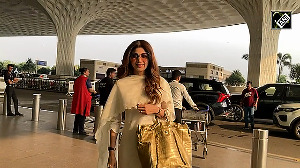In addition to Business Standard, I am a devoted reader of the London-based Financial Times newspaper (a minority investor in Business Standard), and particularly enjoy its very fine weekend supplement, which is devoted to the arts, travel and the good life.
The last page of the aforesaid supplement features a column titled Fast Lane, written by one Tyler Brûlé. I know little of Mr Brûlé other than through his column. There is a photograph, so I assume he is a real person.
Based solely on his writings I have concluded that his idea of a good time appears to be to take as many international flights on as many different airlines in any given week to as many developed country capitals and to write about the experience.
On occasion it seems to me that running a think tank is a similar activity: if this is Tuesday, it must be Belgium. I used to think that this was a failing of mine alone, but with time I have become persuaded that it goes with the territory.
Most of my peers, both domestic and foreign, seem to inhabit a similar existence. As a consequence, one is exposed to a constantly shifting set of stimuli which form fragmentary, ever-changing patterns in the mind.
The last six weeks have been particularly intense, with visits to Beijing, Tokyo, Lahore, and Singapore. These have been interwoven with the high noon of the Delhi intellectual 'season': the annual CII-World Economic Forum India Economic Summit of course, but also other seminars and workshops, including one on the relationship between India and the European Union.
Through this swirl of interaction one question has floated into focus: over the remainder of this new century, where will India's economic and security interests predominantly lie: to the east, facing the Pacific or with the Atlantic powers?
This question is particularly salient this week with the Prime Minister attending the first East Asian Economic Summit in Kuala Lumpur, a summit to which that major Pacific power, the United States, has not been invited. The invitation to this summit represents, if not a triumph, then certainly a coming of age of India's bipartisan "look East" policy, in place more or less since the collapse of the Soviet Union.
Other manifestations of this policy include the patchwork of bilateral preferential trading arrangements (PTAs, often mislabelled free trade arrangements) that we are busy negotiating predominantly (though not exclusively) with our Asian neighbours.
Already concluded are a commercial and economic co-operation agreement (CECA) with Singapore and a trade agreement with Thailand. At Kuala Lumpur it is expected that some kind of agreement will be signed with the Association of South-East Asian Nations (ASEAN) as a bloc.
The prime minister has in the past stated that India is open to concluding PTAs with all Asian countries except China. It is also stated that the government policy is to bring down our external customs duties to "ASEAN levels". This too will facilitate trade integration with these countries.
To a large degree this scramble is defensive. Following the example of Japan two decades earlier, China is integrating these economies into its production system.
China is also a member of the well-established political grouping called ASEAN+3, where it participates in annual consultations with ASEAN at the level of head of state, together with Japan and South Korea. We are just trying to catch up.
In addition, our north-eastern states remain a vulnerable isolated backwater, despite their location on the edge of one of the most dynamic regions of the world. Greater connectivity with China and ASEAN could make a significant difference to that part of India.
So there are sound reasons to deepen our engagement with the rest of Asia to make up for past neglect. But can it, will it, should it become the central pole of our economic and security diplomacy? I doubt it.
As was pointed out at the India-EU workshop, India is historically a western-oriented, maritime power, guarding the sea lanes from Asia to both Africa and Europe. Our history and values are also much more closely bound up with the Atlantic than the Pacific.
In the nineteenth century, following the attack of Napoleon on the Iberian peninsula, the Portuguese king and court relocated to Brazil, which was by then a far more populous lusophone centre than the mother country. In effect this has already happened between Britain and the United States: the values of British liberalism were taken up and projected by the US.
The subcontinent, led by India, belongs naturally in this intellectual tradition, but with distinctive features. The centre of world cricket has already moved to the subcontinent; the centre of spoken and written English will do so in due course.
What is still missing is a sustained commitment in India to economic liberalism. Here the issue is less ideology than powerful vested interests, in both the private and public sectors.
In his dry understated fashion, the Prime Minister reminded the industrial worthies at the India Economic Summit, basking in the complacent glow of a Sensex at around 9,000, that the initial moves at liberalisation were resisted by the Bombay Club.
There is no immediate need for India to choose between East and West; indeed, our recent diplomacy has been quite skilful in operating on both fronts. But I would strongly disagree with those who argue that the West is in economic and political decline and can therefore be ignored.
Penetrating and succeeding in the Atlantic markets, particularly that of the US, should remain our dominant goal. This in turn would be greatly facilitated by a successful conclusion of the Doha Round, in which India has now become a key player.
India has a huge stake in the preservation of an international liberal order, currently under great strain. Until now it has not seen itself as having responsibilities for maintaining that order but this is now changing. Participating in the integration of Asia, while important, will for some time to come be a sideshow. The main event still lies to the West.
The author is Director-General, National Council of Applied Economic Research (NCAER). The views expressed here are personal.







 © 2025
© 2025